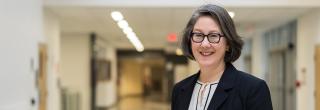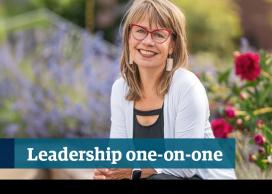Dr. Clare Haru Crowston is the Dean of the Faculty of Arts. She began her five-year term on January 1, 2023.
Prior to joining UBC, Dr. Crowston served as the Associate Dean for Humanities and Interdisciplinary Programs in the College of Liberal Arts and Sciences at the University of Illinois at Urbana-Champaign. She has demonstrated her commitment to academic and research excellence through innovative curriculum development, cross-disciplinary collaboration, and faculty development, as well as by promoting and advancing equity, diversity and inclusion, and Indigenous engagement.
In addition to her role as Dean, Dr. Crowston is a Professor of History. Her research interests lie in the early modern history of women and gender, and of working people in early modern France.
Q1. What quality do you most admire in a leader?
CC: Integrity. I admire those who are committed to their role and their community, and who lead in a principled and open way. Compassion and curiosity are also key – as academic leaders, I feel that it is our responsibility to serve the academic mission and our community by remaining intellectually engaged, alive, curious, and interested.
Q2. What makes you laugh?
CC: Life and the human condition make me laugh – you have to have a sense of humour to navigate the unexpected and to keep your spirits up when things get difficult. Everyone is working under high pressure and to deadlines. If you can have a laugh about something, it brings people together and brightens the mood. Today, what made me laugh is the way my assistant brought some levity to the office by carrying her adorable dog around in a pouch while delivering ‘thank you’ plants to departments that I visited during my listening tour of the Faculty.
Q3. Who inspires you, and why?
CC: My children – I have twin boys in grade 12 and a daughter in 4th year of university, so they’re preparing to graduate. They made it through COVID, online classes, and time away from friends. Now, they’re facing the uncertainty of ending one phase of their lives and going on to the next one, with a lot of unknowns. They inspire me with their hard work, courage, openness to new adventures, and resiliency.
I would expand that sentiment to all of our students. Students have been through so much over the past few years and the ones I’ve met at UBC are demonstrating leadership, community service, academic excellence, and maturity – they are an example to us all.
Q4. For you, what makes UBC different?
CC: When I was considering this role with UBC, what really stood out was the Indigenous Strategic Plan and Anti-Racism Action Plan – now the Strategic Equity and Anti-Racism (StEAR) Framework. At the University of Illinois, I was very involved in efforts toward equity, diversity and inclusion. As an institution, we were making great commitments and I’m proud of the progress we made, but the level of thoughtfulness, ambition and commitment outlined in UBC’s plans are quite exceptional in a North American or even global context. While many plans remain aspirational, UBC has put a lot of thought into implementation and accountability, which I am excited to be working on with my team.
Additionally, UBC’s relationship with Musqueam is unique and distinctive. The Faculty of Arts, in the spirit of reciprocity, is striving to work closely with Indigenous colleagues to realize our commitments to the Truth and Reconciliation recommendations. We now have an Indigenous Advisory Committee that meets once a month, a way to have ongoing dialogue, as well as exchange and receive advice from our Indigenous faculty and staff.
Q5. What is the most important lesson you’ve learned, in your career to date?
CC: I have learned that kindness and compassion are never a mistake. People at every level of our institution want and deserve to be treated with respect and care. There are always moments when you feel challenged by a situation and are tempted to react with anger or harshness. What I have learned is that by asking questions, you will usually learn there is a reason things have developed in a certain way and that the underlying circumstances more often call for compassion than anything else. Everyone is dealing with issues of their own and we could all use more kindness and understanding. After all, you never know when you will need other people to respond to your own situation with compassion.
Q6. How do you like to recharge?
CC: Walking – I do this daily, and I’ve come to believe there are few things in life that cannot be resolved by a long walk. Walking can support your physical, mental, emotional, and intellectual health. I wish I could counsel my younger self to go for a walk more often instead of looking for quick fixes to alleviate stress.
Q7. What is the best advice you were ever given?
CC: You don’t have to do it all at once. You can pace yourself. Trust that you will get things done as they need to be done.
I can get very excited about an idea or new program or initiative and want to do it all right away. Thinking through how to make something a success – how to make it happen, who needs to be involved, and the ideal timing – is a much longer process. That’s just as important as a great idea.
Q8. What do you value in your colleagues?
CC: I value people who can focus on the mission and work productively as part of a team – people who are straightforward, willing to put time and effort into solving problems, have a sense of humour, and are able to see other people’s perspectives. I appreciate those who understand that everyone is in good faith, trying their hardest, working to make things better and move things forward.
Q9. What do you hope will be your lasting impact at UBC?
CC: UBC is a world-leading institution and the Faculty of Arts has units that are already recognized and admired all over the world. I hope that my impact will be to sustain and increase the reputation of UBC as one of the best institutions for research, teaching, and community engagement in the world. That’s what I’m here for.
I’ve been incredibly impressed by all the departments in the Faculty of Arts. They have shown me publications, prizes, labs, posters, plays, and videos – and I’ve heard them talk with such joy and passion about their research and creative work, and about their students with such pride and dedication. My job is to help them continue their excellence, understand their needs, and be a partner in helping them achieve their aspirations.
Q10. If you could have a super power, what would it be?
CC: As a historian, I would love to time travel. I want to hop in and out of historical periods I’ve studied and taught and ask the questions I’m dying to know. The first book I wrote was about seamstresses in France in the 18th century. I’d like to understand what it meant for them to be among the few female guild members at a time when this role was reserved for men. There were a large number of unmarried women in the guild; I’ve always wondered if this was through a conscious choice to lead lives independently of men, at a time when women lost financial and legal autonomy at marriage.
Q11. How has your time and experience in academia prepared you for your role as Dean of Arts?
CC: In terms of leading a large and diverse Faculty, my scholarship has always been interdisciplinary. My research draws on a variety of disciplines, including History, Literature, Anthropology, and Sociology. Within my family, there are also ties to different elements of the Arts Faculty – my brother is a professor of information science and my sister is an art gallery director, so I’m somewhat familiar with these worlds. I also have connections to other cultures and languages (i.e. my mother is from Japan, my husband is from Iran, and I have lived in France) so I have great affinity for our language and culture programs and their impact.
Through my past roles, and most recently, as the Associate Dean of the College of Liberal Arts and Sciences at Illinois, I have had first-hand experience dealing with a very large multi-disciplinary academic unit. These varied experiences gave me confidence that I could do justice to this demanding role. The Faculty of Arts felt like a great fit for someone with my intellectual interests, experiences, and background.
Q12. What is your vision for the future of the Faculty of Arts over the next five years?
CC: My vision is to make a great deal of progress in implementing the Indigenous Strategic Plan and StEAR Framework, and that we will continue to serve as a model for other institutions trying to make progress in these areas. I want to ensure we have the proper policies, procedures and guidelines in place so we’re prepared to respond to any unexpected issues that may come our way.
I hope to strengthen the existing excellence of the Faculty of Arts so that we provide students with what they need to be successful graduates. We need to help faculty members succeed in their research, teaching, and community service, progress through the ranks, and prepare to become future leaders.
I’m surrounded by people with a lot of experience here, who know UBC extremely well and have been working very effectively and with a great deal of dedication. I’m delighted with the Dean’s office team, the leadership of the departments, schools, and institutes, and all the staff members who help make ideas come to life. I have every faith that we will make great progress.
Published: September 11, 2023
Interviewed by: Alpha Lam, UBC Internal Communications



